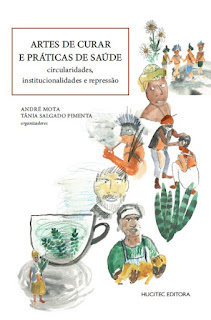Novedad bibliográfica: Artes de curar e práticas de saúde: circularidades, institucionalidades e repressão

Editado por André Mota y Tânia Salgado Pimenta. O universo das artes de curar sempre fez parte das relações estabelecidas entre os homens e a vida que o cerca, a partir de práticas e representações que buscam conter os sofrimentos e dirimir as dores do corpo e da alma. Acompanhar historicamente como se deram tais contextos é o convite para a leitura dessa coletânea. O livro apresenta um panorama dos estudos atuais sobre as artes de curar no Brasil, enriquecido com análises que abrangem a Argentina e a Península Ibérica. Os estudos que compõem este livro sobre as artes de curar contribuem para a ampliação e o aprofundamento das análises sobre o tema ao demonstrarem que as pessoas que exerciam as diversas artes de curar sem formação acadêmica não possuíam um perfil único e homogêneo. Curandeiros, parteiras, sangradores são exemplos de ofícios que abrigam atuações e formações baseadas mais ou menos nas tradições africanas, indígenas ou europeias. Contemplando as circularidades e a repress...